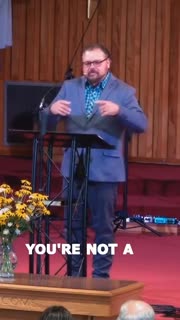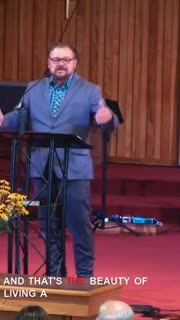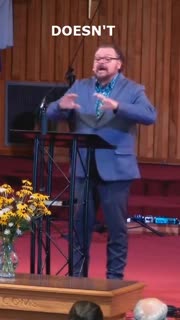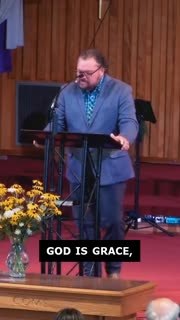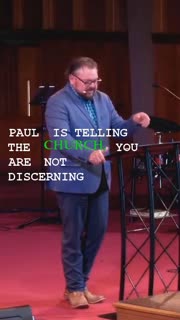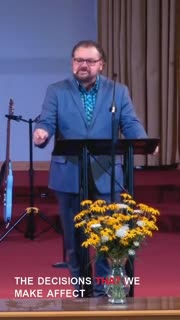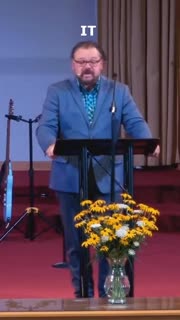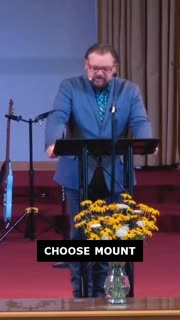Embracing Grace: Freedom in Christ Over Law
Summary
### Summary
Good morning, church family. Today, we explored the profound truth of God's grace and the freedom we have in Christ, as illustrated in Galatians 4. We began by reflecting on Sue's powerful testimony and song, which reminded us of God's goodness even in the midst of trials. We then delved into the concept of dysfunctional families, both in our modern context and throughout biblical history, highlighting that dysfunction is not new and has been present since the time of Adam and Eve.
We examined the story of Abraham, Sarah, and Hagar, focusing on the two sons, Ishmael and Isaac, and their significance in the debate between law and grace. Abraham's attempt to fulfill God's promise through human effort resulted in Ishmael, a child born of the flesh, symbolizing legalism and bondage. In contrast, Isaac, the child of promise, was born through faith and represents the freedom we have in Christ.
Paul's allegory in Galatians 4 draws a parallel between these two sons and the two covenants: the old covenant of the law, which leads to slavery, and the new covenant of grace, which leads to freedom. We are reminded that our salvation is not based on our efforts or adherence to the law but on faith in Jesus Christ. The law serves to show us our need for a Savior, but it is grace that saves us.
We also discussed the importance of waiting on God's timing and trusting in His promises, rather than trying to help God out with our own plans. Abraham and Sarah's impatience led to significant consequences, but God's plan ultimately prevailed. This teaches us that God's timing is perfect, and His promises are sure.
Finally, we reflected on the choice we must make between living under the law or embracing the freedom of grace. We are called to rely on God's grace and love, rather than our own achievements. True freedom is found in Christ alone, and we are invited to be part of God's family through faith in Jesus.
### Key Takeaways
1. God's Goodness in Trials: Sue's testimony and song remind us that God's goodness remains constant, even in the midst of suffering. Our faith allows us to see His goodness beyond our circumstances, knowing that His ultimate healing and peace are eternal. [36:34]
2. Dysfunctional Families in Scripture: Dysfunctional families are not a modern phenomenon; they are present throughout the Bible. From Adam and Eve to David, we see that human flaws and failures are part of our story, but God's grace is always greater. [40:35]
3. Law vs. Grace: The story of Ishmael and Isaac illustrates the difference between living under the law and living under grace. Ishmael, born of human effort, symbolizes bondage, while Isaac, born of faith, represents the freedom we have in Christ. Our salvation is through faith, not our own works. [42:48]
4. Waiting on God's Timing: Abraham and Sarah's impatience led to significant consequences, but God's plan ultimately prevailed. This teaches us the importance of trusting in God's timing and His promises, knowing that His ways are higher than ours. [56:43]
5. Choosing Grace Over Law: We must choose between living under the law, which enslaves us, and embracing the grace of God, which frees us. True freedom is found in Christ alone, and we are invited to be part of God's family through faith in Jesus. [01:17:11]
### YouTube Chapters
[0:00] - Welcome
[36:34] - Sue's Testimony and Song
[37:13] - Introduction and Opening Prayer
[37:47] - Dysfunctional Families in Modern Times
[39:50] - Biblical Examples of Dysfunctional Families
[41:21] - Paul's Concern for the Galatian Church
[42:09] - Historical Context: Abraham, Sarah, and Hagar
[42:48] - Reading Galatians 4:21-31
[44:25] - Prayer and Reflection on Grace
[44:59] - Paul's Argument Against Legalism
[46:22] - Allegory of Ishmael and Isaac
[48:07] - Abraham's Faith and God's Promise
[49:20] - Consequences of Human Effort
[51:24] - Ishmael's Legacy and Modern Implications
[53:09] - Isaac: The Child of Promise
[56:43] - Trusting God's Timing
[57:23] - God's Sovereignty and Our Obedience
[01:00:17] - Personal Testimony: Waiting on God's Plan
[01:01:18] - Helping God vs. Trusting God
[01:02:27] - Two Covenants: Enslavement vs. Emancipation
[01:05:29] - Two Choices: Law or Grace
[01:09:27] - Persecution and Faith
[01:11:05] - The Outcome: Freedom in Christ
[01:17:11] - Invitation to Choose Grace
[01:19:17] - Closing Prayer and Invitation
[01:23:04] - Welcome New Member
Study Guide
### Bible Reading
- Galatians 4:21-31
- Genesis 16:1-12
- Genesis 21:1-12
### Observation Questions
1. What are the two covenants represented by Hagar and Sarah in Galatians 4:21-31? How do they differ? ([42:48])
2. How did Abraham and Sarah's impatience lead to the birth of Ishmael, and what were the consequences? ([48:07])
3. What does Paul mean when he says that "the Jerusalem above is free"? ([43:21])
4. How does the story of Isaac's birth illustrate the concept of faith and promise? ([55:30])
### Interpretation Questions
1. How does Paul's allegory of Hagar and Sarah help us understand the difference between living under the law and living under grace? ([42:48])
2. In what ways does the story of Abraham, Sarah, and Hagar teach us about the importance of waiting on God's timing? ([56:43])
3. How can the concept of "true freedom in Christ" be applied to modern-day struggles with legalism and self-effort? ([01:17:11])
4. What lessons can we learn from the consequences of Abraham and Sarah's decision to "help God out" with their own plans? ([01:01:18])
### Application Questions
1. Reflecting on Sue's testimony, how can you recognize and celebrate God's goodness in the midst of your own trials? ([36:34])
2. Dysfunctional families are a common theme in the Bible. How can understanding this help you deal with dysfunction in your own family? ([40:35])
3. The sermon emphasized the importance of waiting on God's timing. Can you identify a situation in your life where you need to trust God's timing more? What steps can you take to do so? ([56:43])
4. How can you ensure that you are living under grace and not falling back into legalism in your daily walk with Christ? ([01:17:11])
5. Think of a time when you tried to "help God out" with your own plans. What were the results, and what did you learn from that experience? ([01:01:18])
6. How can you practically rely more on God's grace and love rather than your own achievements in your spiritual journey? ([01:17:44])
7. Identify one area in your life where you feel enslaved by legalism. What steps can you take this week to embrace the freedom that comes from living under God's grace? ([01:17:11])
Devotional
Day 1: God's Goodness in Trials
Description: In the midst of life's trials and tribulations, it can be challenging to see God's goodness. However, Sue's testimony and song remind us that God's goodness remains constant, even when we are suffering. Our faith allows us to perceive His goodness beyond our immediate circumstances, knowing that His ultimate healing and peace are eternal. This perspective helps us to trust in God's character and His promises, even when we don't understand our current situation. By focusing on God's eternal goodness, we can find hope and strength to endure our trials. [36:34]
Psalm 27:13-14 (ESV): "I believe that I shall look upon the goodness of the Lord in the land of the living! Wait for the Lord; be strong, and let your heart take courage; wait for the Lord!"
Reflection: Think of a recent trial you have faced. How did you see God's goodness in that situation, and how can you remind yourself of His goodness in future trials?
Day 2: Dysfunctional Families in Scripture
Description: Dysfunctional families are not a modern phenomenon; they have been present throughout biblical history. From Adam and Eve to David, we see that human flaws and failures are part of our story. Despite these imperfections, God's grace is always greater. The Bible provides numerous examples of how God works through imperfect people and families to accomplish His purposes. This reminds us that no matter how broken our family situation may be, God's grace can bring healing and redemption. We are encouraged to trust in God's ability to work through our weaknesses and to extend grace to others in our families. [40:35]
Genesis 50:20 (ESV): "As for you, you meant evil against me, but God meant it for good, to bring it about that many people should be kept alive, as they are today."
Reflection: Reflect on a time when you experienced dysfunction in your family. How did you see God's grace at work in that situation, and how can you extend grace to your family members today?
Day 3: Law vs. Grace
Description: The story of Ishmael and Isaac illustrates the difference between living under the law and living under grace. Ishmael, born of human effort, symbolizes bondage, while Isaac, born of faith, represents the freedom we have in Christ. Our salvation is through faith, not our own works. The law serves to show us our need for a Savior, but it is grace that saves us. This distinction is crucial for understanding our relationship with God. We are not bound by the law's demands but are free to live in the grace and love of Christ. This freedom allows us to serve God out of gratitude rather than obligation. [42:48]
Galatians 3:24-25 (ESV): "So then, the law was our guardian until Christ came, in order that we might be justified by faith. But now that faith has come, we are no longer under a guardian."
Reflection: Consider an area of your life where you feel bound by legalism. How can you embrace the freedom of grace in that area and live out your faith with joy and gratitude?
Day 4: Waiting on God's Timing
Description: Abraham and Sarah's impatience led to significant consequences, but God's plan ultimately prevailed. This teaches us the importance of trusting in God's timing and His promises. God's ways are higher than ours, and His timing is perfect. When we try to take matters into our own hands, we often create more problems. Instead, we are called to wait on the Lord and trust that He will fulfill His promises in His perfect timing. This requires patience and faith, but it also brings peace and assurance that God is in control. [56:43]
Isaiah 40:31 (ESV): "But they who wait for the Lord shall renew their strength; they shall mount up with wings like eagles; they shall run and not be weary; they shall walk and not faint."
Reflection: Think of a promise from God that you are waiting to see fulfilled. How can you practice patience and trust in His timing today?
Day 5: Choosing Grace Over Law
Description: We must choose between living under the law, which enslaves us, and embracing the grace of God, which frees us. True freedom is found in Christ alone, and we are invited to be part of God's family through faith in Jesus. This choice requires us to rely on God's grace and love rather than our own achievements. By embracing grace, we experience the fullness of life that God intends for us. This freedom allows us to live with joy, peace, and purpose, knowing that we are loved and accepted by God. [01:17:11]
Romans 6:14 (ESV): "For sin will have no dominion over you, since you are not under law but under grace."
Reflection: Reflect on an area of your life where you are striving to earn God's favor. How can you shift your focus to rely on His grace and experience the freedom that comes from being part of His family?
Quotes
### Quotes for Outreach
1. "Because if you're not a believer in the Lord Jesus Christ today, you can't understand how an entire family can struggle with surgeries and cancer and still come out and say, you know what, the Lord is good. Because He's good all the time." [36:34] (12 seconds)
2. "And that's the beauty of living a Christian life. Because one day, you're going to die a Christian death. And that's when life is really going to start." [37:13] (9 seconds)
3. "God doesn't need us to help him out. Just remember that. God is God. God is sovereign. God is in control of all things. God does not need our help. And when God makes a promise, you can write it down and put a period on it. Because when God promises something, it's as good as done." [48:46] (20 seconds)
4. "The only way to God is grace, and the only way to grace is faith. Now, there's a couple of points here. Number one, God is sovereign over the ends and the means. He tells them, I'm going to give you a son. That's the end. Sarah decides, we'll take care of the means. God is sovereign over the ends and the means." [56:43] (20 seconds)
5. "If you're waiting on God, maybe God's teaching you something. Maybe God's teaching you that he is enough for you. That the number one relationship that you need to have, whether you are married or whether you are single, is your relationship with God. That is the most important because if you take care of that relationship, every other relationship in your life will already be taken care of." [57:23] (22 seconds)
### Quotes for Members
1. "Paul is telling the church, you are not discerning between law and grace. You seem to be eager to saddle yourself with the regulations of Moses and the law. And so he gives them an illustration of what they're doing. He takes them back to the book of Genesis and gives them a spiritual lesson, one that is very much to the point of view, of what they are proposing to do." [42:09] (21 seconds)
2. "The law has nothing to do with our rebirth. It has nothing to do with our salvation. The one thing that the law will do, is drive us to Jesus. The law acted like a schoolmaster, that led us to Christ. But the law can't save us. The law is the mirror that shows us the dirt on our face, but it's not the soap that wipes the dirt off of our face. All it can do is drive us to Christ." [01:07:03] (25 seconds)
3. "The decisions that we make affect generations. And Sarah and Abraham made decisions for their family that are affecting many of our families today. Now let me say this. The whole family got it wrong. They were all dysfunctional. But God is going to make things right. And the encouraging news is that ultimately God is bigger than our failures and our flaws and our faults and our families." [01:01:52] (24 seconds)
4. "And the good news is, it doesn't matter if you're a Jew. It doesn't matter if you're an Arab. It doesn't matter if you're an atheist. It doesn't matter who you are or where you come from. God wants you to come to him. Through Jesus Christ and to become a follower of Christ, a member of his family." [01:13:07] (18 seconds)
5. "You can either choose Mount Sinai, the law of Moses, which enslaves you, boxes you in, removes you from the freedom that you have in Jesus, or you can choose Mount Calvary and the grace of God. God's love poured out for you in the death of his one and only son, Jesus Christ." [01:17:11] (16 seconds)
